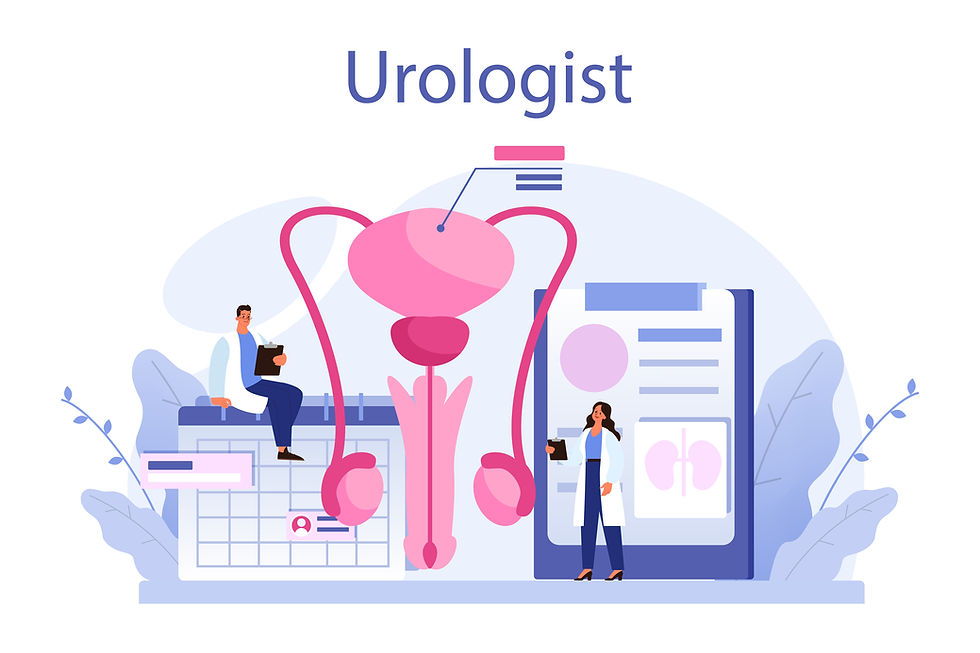
Urology is a significant department of medicine that focuses on detecting and treating urinary tract and male reproductive system disorders. Urologists are essential in protecting our urinary health and overall well-being, from kidney stones to prostate difficulties.
What is Urology?
Urology is a vital medical speciality dedicated to the urinary system and male reproductive health care. Urologists address various conditions through comprehensive diagnostic approaches and tailored treatments to enhance urological health and overall well-being. Regular check-ups with a urologist are essential for the timely detection and management of urological issues, promoting a healthier and more fulfilling life for both men and women.
In layman's words, it is the treatment of diseases affecting the urinary tract, bladder, urethra, prostate, kidneys, and male reproductive system. The conditions diagnosed and managed include urinary tract infections (UTIs), kidney stones, bladder issues, prostate problems, erectile dysfunction, urinary incontinence, and cancers of the kidneys, bladder, prostate, and testicles.
What Do Urologists Specialise In?
Urologists specialise in diagnosing and treating urinary system illnesses. They also include cancer screening and treatment, paediatric urology, female urology, and sexual health and fertility care.
Common Conditions Treated by Urologists
Let's delve more into the six common conditions treated by urology doctors.
1. Urinary Tract Infections (UTI)
UTIs can affect anyone, although they are more common in women. However, UTIs in men can be more severe and necessitate more significant treatment. UTIs can also lead to more serious health issues like kidney infections. Urologists treat UTIs with antibiotics and address underlying conditions contributing to the infection.
2. Kidney Stones
Kidney stones are another health ailment that can affect both men and women. Small kidney stones, in general, are not bothersome and can pass through the system on their own. Urology surgeons may need to perform lithotripsy or other surgical procedures on larger stones to alleviate their discomfort.
3. Prostate Problems
Prostate issues are typical among elderly men. Swelling and inflammation in the prostate gland, which produces sperm, can cause various problems, including difficulties urinating and pelvic pain. Depending on the underlying issue, urology consultants may recommend medication or surgery.
4. Male Infertility
Male infertility is another area in which urology doctors concentrate. Various circumstances, such as poor sperm production, poor sperm quality, or reproductive system blockages, can cause infertility.
5. Erectile Dysfunction
Erectile dysfunction is a male-specific disorder that can make it challenging to obtain or sustain an erection during sexual engagement. Urology doctors frequently treat the underlying medical issues that cause erectile dysfunction and provide remedies such as drugs or surgery.
6. Pelvic Organ Prolapse
Pelvic organ prolapse is the sinking or protrusion of organs such as the bladder or intestines into the vagina that occurs in women who have had several pregnancies, are overweight, and are in menopause. Urology doctors can collaborate with these folks to address the underlying problem and manage any associated symptoms.
Procedures Performed By Urologists
Urology specialists are trained surgeons who carry out a variety of urologist procedures depending on the disease or situation at hand. Urologists commonly perform the following procedures:
1. Kidney Transplant
A kidney transplant entails replacing a sick kidney with a healthy one, and this is another surgery in which urology specialists specialize. Laparoscopic surgery can restore injury damage and correct poorly shaped urinary organs.
2. Cystoscopy
It is a treatment that involves inserting a thin, flexible tube with a camera (cystoscope) into the urethra and bladder to look for abnormalities or obstructions in the urinary tract.
3. Lithotripsy
Shock waves are a non-invasive method to break down kidney stones into smaller fragments, making them simpler to pass or remove.
4. Vasectomy
A male sterilisation surgical treatment involves cutting and closing the vas deferens to prevent sperm from reaching the sperm.
5. Bladder Surgery
Urology specialists may conduct bladder procedures to treat problems such as bladder cancer, urine incontinence, or bladder diverticulum.
6. Testicular Surgery
Urologists may undertake surgery to treat problems such as testicular cancer, hydrocele (a fluid-filled sac around the testicle), or varicocele (enlarged veins in the scrotum).
When To See A Urologist?
Contact a urologist if you are facing an issue or problem that needs medical advice. Symptoms may include blood in the urine, pain while urinating, trouble urinating, etc. You should see a professional if you have a family history of urological issues. For the best Urologists in New Delhi, please call or visit Jain Multispeciality Hospital in Shalimar Bagh.

Comments